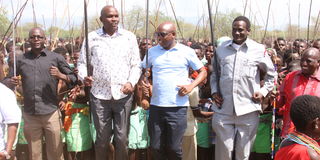Breaking News: Old Kijabe dam tragedy: Death toll rises to 45
Minority Ilchamus eyeing Baringo assembly Speaker’s seat

Former Baringo County Assembly Clerk Richard Koech (left), outgoing Governor Stanley Kiptis (second left), Baringo South MP Charles Kamuren and agriculture CEC Thomas Longonop dance with Ilchamus initiates during an initiation cultural ceremony of more than 10,000 initiates from the Ilchamus community at Lekiricha village in Baringo South on September 30, 2020.
The minority Ilchamus community in Baringo South is eyeing the Baringo County Assembly Speaker’s seat in a push for negotiated democracy.
This is after a parliamentary candidate they fielded was defeated in the August 9 polls.
The Pokot and Ilchamus in Baringo County have over the years complained about being sidelined by the dominant Tugen in leadership. They argue that this keeps them out of crucial dockets and nominations.
As in past elections since the advent of devolution, all the major elective seats in the county in the recent polls, including governor, senator and woman representative, went to the populous Tugen.
Although the community has for years fielded a parliamentary candidate against its Tugen counterparts, none has ever sailed through. In the recent elections, for instance, the community fielded a candidate for the Baringo South parliamentary seat who battled it out with Tugen candidates.
Dickson Keiss, a former education director, vied for the position under Jubilee but lost again to the incumbent Charles Kamuren of the United Democratic Alliance (UDA).
MP Kamuren, a former unionist with Knut, was defending his seat for a second term and garnered 15,200 votes against Mr Keiss from Ilchamus community, who got 9,800. Joseph Tarus (independent) received 6,782 votes, Abraham Mengich (314) and Richard Moindi of Kanu 221.
Mr Kamuren took over after he won a by-election under Jubilee in August 2018 following the demise of Grace Kipchoim in April that year from colon cancer.
County cake
The minority and marginalised communities’ national patron, Amos Olempaka, who hails from Ilchamus community, stated that in order for them to have a taste of the county government cake, they should have the county assembly Speaker’s seat.
He argued that due to their small numbers, it is near impossible for them to secure any major elective and parliamentary seat in the region.
“Election is all about numbers and the democratic process is pegged on the number of voters, which the minority Ilchamus don’t have. In a fair democratic process, they cannot elect their own,” said Mr Olempaka.
Having unsuccessfully vied twice for the Baringo South parliamentary seat, he regretted that the community’s small numbers were a major setback.
“Because we cannot manage to vie for major elective seats, we have tried the parliamentary seat several times but as it seems, it is hard to win owing to our numbers, with the seat being won by candidates from the majority Tugen,” he said.
“The Pokot have also suffered the same fate but they have an advantage over us because they have their own constituency, with more than seven wards.”
Ilchamus constituency
He said it would have helped if they had their own constituency. They also share the four wards in Baringo South – Mochongoi, Mukutani, Ilchamus and Marigat – with the Tugen.
In the recent elections, the Ilchamus clinched two ward representative positions in Ilchamus and Mukutani through Wesley Lekakimon (ODM) and Paul Lolgisoi (Jubilee).
“The probability of a candidate from Ilchamus becoming governor, senator or woman representative is low and our efforts to have a constituency of our own has hit a dead end,” Mr Olempaka said.
“That is why we are pushing for negotiated democracy so that we are not pushed to the periphery and only watch as other communities take all the positions.”
He added: “To feel accommodated, apart from the county executive slots, we are also demanding that the county assembly Speaker seat be reserved for Ilchamus.
“We were also pushing to have one of our own nominated to the National Assembly by political parties, but so far there is none.”
Having missed out on elective posts several times, the community on the shores of Lake Baringo has been pushing for the creation of their own constituency so that they can agitate for their issues in Parliament, but these efforts have not succeeded.
Nominations
The Ilchamus also said they were locked out of nomination slots and the East African Legislative Assembly in 2017.
“Due to their big numbers, we fear our Tugen brothers will continue to dominate us and we’ve no chance of ascending to any political leadership in the county as well,” said Mr Olempaka.
“Owing to our small numbers in Baringo County, we have no political representation, save for only two members of the county assembly.”
Former Independent Electoral and Boundaries Commission (IEBC) member Thomas Letangule lamented that the community has pushed for the creation of their own constituency over the years in vain.
IEBC proposals
The community complained that the views they presented to the IEBC on an Ilchamus constituency during the last boundary review were not taken into account.
They had also submitted the same proposal to the predecessor of the IEBC in 2010, to no avail.
IEBC records show that the Ilchamus have more than 13,000 registered voters.
The Pokot community, which occupies Tiaty constituency, expresses similar complaints, and they are now pushing for the deputy governor and deputy Speaker posts.
A similar consensus worked in 2013, when the Pokot took the Speaker’s slot (held by William Kamket, now the Tiaty MP) as a way of accommodating all communities in the county leadership.





